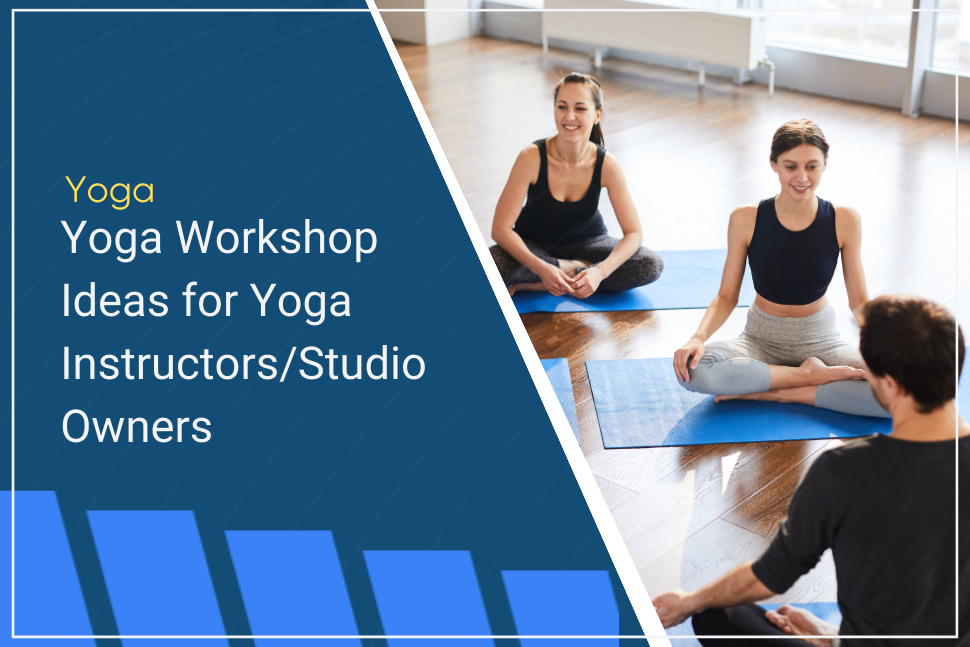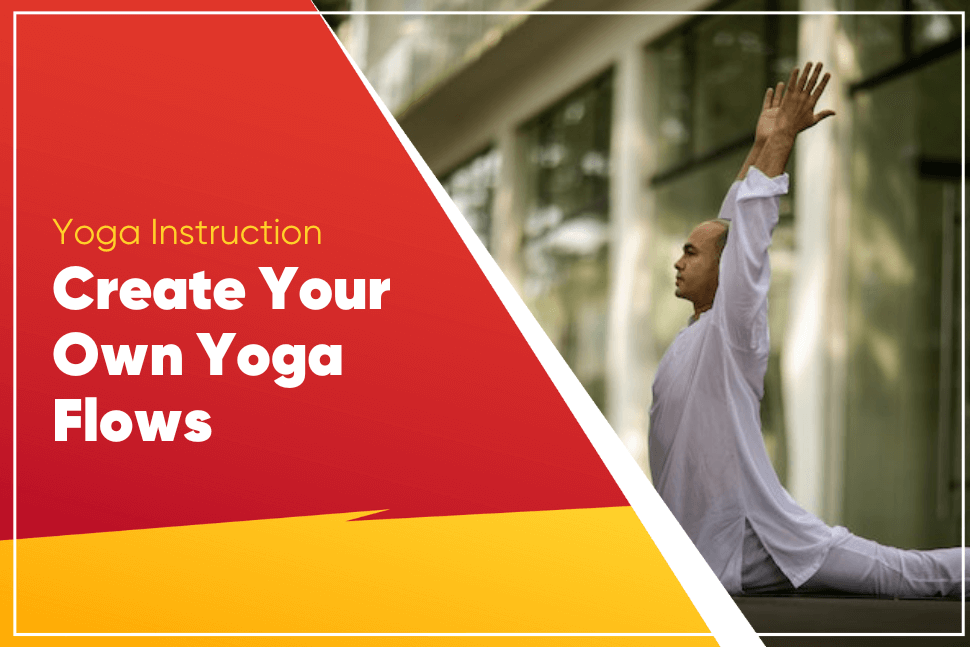Yoga has emerged as one of the most popular ways to find the mental and physical balance, strength, and fitness many people strive for.
Yoga instructors and studio owners are increasingly important as yoga becomes more ingrained in our culture. Workshops have become a vibrant and transformative platform within the yoga environment. These courses open the door to self-discovery, inner healing, and community development; they provide something more profound than the typical asana practice.
In this article, we explore the rapidly expanding yoga market, the profound significance of yoga workshops within this context, and the wide range of professionals and amateurs who stand to gain from these life-changing events. Whether you’re a seasoned yoga teacher wishing to diversify your services or a studio owner searching for creative methods to grow your business, this article is your key to opening new vistas of success through yoga workshops.
Yoga Workshop Ideas and Themes
After laying the groundwork for your yoga course, it’s time to explore yoga workshop ideas, themes, and concepts. Just like picking the ideal paint colors for an artist’s canvas, choosing the ideal theme or concept for your workshop establishes the mood and defines the overall experience for your attendees. Here are a number of workshop themes and ideas that cater to a variety of yoga practitioners and future teachers:
Yoga for Everyone
Yoga Workshops for Beginners: This workshop slowly acclimatizes novices to the practice. Concentrate on the fundamentals, correct alignment, and increasing practice confidence.
Intermediate Practitioners: Provide seminars that test and broaden the participants’ perspectives even if they are already familiar with fundamental yoga positions. Expand your knowledge of particular yoga positions, breathing exercises, or philosophical ideas.
Experienced Yogis: Plan seminars that push the limits of the body and the spirit for advanced practitioners. Investigate advanced asanas, meditation techniques, or yogic philosophy.
Yoga Adoption Event: Partner with a local shelter to practice yoga with furry friends and drive adoption of dogs and cats or other friendly animals.
Family Yoga: Encourage whole families to come together and practice yoga. This is a great way to target certain demographics and fill up both adult and children’s yoga classes. It might even reveal the need for a family class!
Dedicated Workshops
CorporateYoga: Stress management and overall well-being are crucial in today’s fast-paced corporate world. Create workshops that are tailored to the specific requirements of professionals. Provide strategies and methods to improve concentration, lower stress levels, and increase productivity at work.
Yoga Teacher Training: Hold thorough teacher training seminars for aspirant yoga instructors or those looking to hone their instructional techniques. Discuss subjects such as anatomy, teaching strategies, and effective communication.
Yoga Retreats: Take your participants to picturesque locations for all-encompassing yoga retreats. Combine regular yoga classes with community-building activities, mindfulness exercises, and outdoor trips.
Original Workshop Suggestions
Yoga and Wellness Fusion: Work with wellness professionals to develop all-encompassing seminars that cover yoga, nutrition, and mental health. Examine the connections between these components and overall health.
Yoga for Stress Relief and Mindfulness: Workshops that concentrate on stress reduction, mindfulness, and meditation techniques can be extremely popular in today’s high-stress society.
Yoga and Art Retreats: These retreats combine the therapeutic advantages of yoga with artistic expression. These workshops may be an effective tool for personal growth.
Yoga and Nature Retreats: Hold your courses in tranquil natural settings so that your attendees can practice yoga outside and re-energize their spirits.
Yoga for Specific Health Conditions: Tackle the special requirements of people with ailments including arthritis, anxiety, or back pain. Create custom workshops and drills to address these problems.
You can broaden your workshop selection to appeal to a variety of yoga aficionados, aspiring instructors, and even corporate clients by exploring themes and concepts. Each theme has the potential to open up fresh perspectives on how the yoga community might develop and interact.
A Closer Look at Corporate Yoga
Corporate yoga classes take into account the particular demands and difficulties experienced by workers in the corporate sector. Long hours, continual connectedness, and stressful situations can be detrimental to one’s physical and mental health. These workshops recognize these difficulties and provide workable answers.
Corporate yoga classes have a strong emphasis on stress reduction and mindfulness practices. Through exercises like deep breathing, meditation, and yoga postures, they instruct staff members on how to manage professional stress. Employees can increase their focus, decision-making, and general well-being by lowering their stress levels.
Workshops specifically address the topic of productivity and concentration. Techniques that promote mental clarity, such as guided concentration exercises and yoga stretches, are combined. Employees acquire the skills necessary to efficiently handle distractions, maintain organization, and maximize their workday.
Corporate yoga programs are specifically designed with the workplace in mind. This covers topics including balancing work and life, dealing with pressing deadlines, and techniques you can use during a hectic workday. The workshops offer practical lessons that can be used right away in the workplace.
The physical component of well-being in the workplace is also covered in these workshops. Employees are instructed on correct workplace ergonomics to avoid common problems like back pain and carpal tunnel syndrome.
Corporate yoga classes help create a culture of positivity at work. They generate open communication among staff members, a sense of community, and a nurturing environment. Employees are more likely to succeed in their professions when they feel valued and supported.
Payments, scheduling & booking, lead management, and email & SMS marketing all from the same place.Yoga Software to run Amazing Studios (and Workshops)
Yoga Workshop Marketing and Promotion
An effective yoga workshop depends on effective marketing and promotion. Once you’ve created a captivating workshop concept, identified your target market, and established clear goals, it’s time to publicize your event and ensure the proper people attend.
Here’s an overview of the methods and techniques to efficiently market your yoga workshop:
Developing Attention-Grabbing Workshop Materials
Creating visually appealing and educational materials that capture the spirit of your event is one of the first stages in marketing your yoga class. These materials represent your workshop to the outside world, providing not only crucial information but also a distinctive experience that attendees can look out to.
Hire a graphic designer or use internet tools to develop aesthetically attractive flyers and posters. Include key details like the date, time, place, and cost, as well as components that reflect the theme or concept of your workshop.
Website Landing Page
Develop a compelling landing page just for the workshop on your website. Make sure it is user-friendly, responsive to mobile devices, and SEO-optimized. Include a compelling summary of what attendees may look forwards to, registration options, and endorsements from past attendees.
Engaging Video Promotions
Videos are effective tools for grabbing viewers’ attention. Make brief promotional movies that demonstrate moments from your yoga workshop, promote its advantages, and include praise from pleased participants. Design shareable and attention-grabbing graphics for social media sites to engage users. These images can be used to publicize the workshop, provide key information, and generate excitement before the event.
Email Invitations
Create customized email invites that hint at the workshop’s offerings. Add eye-catching graphics, obvious calls to action, and a link to the workshop’s main page to make signing up simple.
Social Media Platforms
Social media and online channels are crucial for workshop promotion in the digital age. These platforms provide an enormous and reachable audience, which makes them perfect for promoting your event. Select the social media channels that are most compatible with your target demographic. The yoga community frequently uses Facebook, Instagram, Twitter, and YouTube as social media platforms. If necessary, create specific profiles or pages for your workshop.
Paid Advertising
Think about making an investment in paid marketing on social media sites. Reach people who are interested in yoga, wellness, or related topics by using tailored advertising. Spend your money carefully to increase engagement and reach.
Working with Partners and Influencers
Your yoga workshop’s visibility can be increased by utilizing the influence and reliability of influencers and strategic partners. Look for people or groups who share the ideals and theme of your workshop. Identify yoga influencers and practitioners who have a sizable following to form influencer partnerships with. Market your workshop with sponsored articles, in-person events, or combined campaigns. Influencers can offer sincere recommendations that appeal to their followers.
Establish collaborations with neighborhood yoga studios, health food shops, and wellness enterprises. Cross-promote your workshop by providing discounts or incentives to their clients and vice versa. Invite well-known yoga instructors or wellness specialists to lead particular sessions of your program or deliver guest lectures. Their participation might increase credibility and draw a larger audience.
Pre-Workshop Events
Hold pre-workshop get-togethers or webinars so that attendees can get to know the instructors, ask them questions, and connect with one another. This increases eagerness and a sense of community. Encourage prior attendees to post testimonials and experiences from their workshops on your website and social media. Genuine feedback from peers can inspire potential attendees to come.
Attend local yoga and wellness networking events to meet like-minded people and prospective business partners. Developing solid connections inside the sector can lead to new opportunities.
Yoga Workshop Logistics
Planning the logistics for a yoga workshop, though not as glamorous as creating appealing marketing materials or the ideal class schedule, are unquestionably the foundation of a successful event. Every logistical consideration, from selecting the ideal location to handling registrations and making sure you have the required tools, is essential to the entire experience for both you and your attendees. Here are the crucial components of workshop logistics:
Choosing and Preparing a Venue:
The setting you select can greatly impact your yoga workshop’s mood, comfort, and general success. The following are important things to consider:
- Location: Pick a location that complements the scope and theme of your program. Yoga studios, community centers, and outdoor areas like parks and beaches are all options.
Ensure the location has enough space to comfortably hold the anticipated attendees. A little more room is preferable to a crowded area. Participants can move freely and keep social distance as needed with enough room.
- Services: Verify whether the location has services, including locker rooms, restrooms, parking, and accessibility for those with disabilities. These elements influence the comfort and convenience of the participants.
- Ambience: Take into account the setting’s atmosphere. Does it support the fundamental idea or theme of your workshop? Whether your event is in a lively urban setting or a tranquil retreat setting, the environment should be appropriate for the aim of the event.
- Equipment & Props: Verify that the location has the proper yoga props (mats, blocks, straps), and if you must, ask about renting or bringing your own. If your workshop will incorporate presentations or music, check the location’s audio-visual capabilities. If necessary, ensure enough outlets, microphones, projectors, and displays are available.
- Safety Precautions: Make sure the location can accommodate any necessary safety precautions, such as ventilation, cleaning procedures, and, if necessary, space for social seclusion.
Plan the setup and design of the venue to create a warm and engaging setting consistent with your workshop’s concept. Use signage to properly direct participants.
Workshop Schedule and Length
Your yoga workshop’s length and schedule will help shape participant expectations and maintain a seamless flow of events. Here are the steps to follow:
- Determine the ideal duration of your workshop. Take into account the participants’ stamina and the complexity of the subject matter. Workshops may last a few hours or several days.
- Establish a complete schedule for your session, including start and stop hours, break periods, and, if necessary, food times. Participants should be informed in advance of this schedule so they can make appropriate plans.
- Schedule regular pauses so that participants can take a break, hydrate, and use the restroom. The workshop experience can be hampered by fatigue, so alternate active periods with plenty of rest.
- Establish transition times. Allow enough time for people to move between sessions, especially if you’re holding various events in various parts of the site.
- Provide a range of session types, such as lectures, practical sessions, group discussions, and breaks for rest or meditation. This maintains participant interest and offers a complete experience.
- Plan for flexibility. Be ready for unforeseen delays or changes. Flexible scheduling and open communication with participants will make handling disruptions easier.
Regarding the schedule, Gymdesk’s scheduling feature makes it easy for you to block out time, update blocks, and immediately make that schedule available to attendees.
Pricing and Available Payment Methods
A key logistics component is pricing your yoga workshop because it directly impacts your revenue and attendance. Here’s what you need to consider:
- Calculate the overall cost of putting together the workshop, taking into account venue rental, teacher fees, marketing costs, and any additional overhead. The basis for your pricing approach is established by this.
- Examine comparable workshops in your area to determine the pricing trends that are currently in effect. Think about how the value of your workshop stacks up against the competition.
- Offer both early bird and standard pricing to encourage early registration. Switch to regular pricing to increase sales as the event day draws near.
- Provide a variety of payment methods, including bank transfers, PayPal, and credit cards, to satisfy the preferences of the participants.
- Procedures for Cancellations and Refunds: Clearly define your procedures for cancellations and refunds. Make these policies clear upfront in order to control participant expectations.
- Discounts and Scholarships: Take into account providing discounts to elders, students, or others in need of assistance. Scholarships might help increase the audience reach of your program.
Handle payments easily with our billing system. Take workshop payments on your website or from a dedicated event webpage.
Tracking Attendance and Registration
Managing participant registration and attendance accurately is crucial for a successful session. Consider implementing the following:
- Set up an online registration system to make the enrolment process more efficient. Use systems that are simple to use so that participants can register and submit the required information with ease.
- After registration, automated confirmation emails with information about the workshop’s schedule, location, and payment should be sent out.
- Prepare name tags or badges for each participant. These can foster community building and networking.
- Maintain a list of all participants who have registered and check them in as they arrive. Think about employing software or mobile apps for effective tracking.
- Make a decision regarding how to deal with latecomers. Make sure latecomers can join without interfering with the current session.
- Implement a waitlist system if your workshop fills to capacity in order to account for potential last-minute cancellations or no-shows.
Gymdesk’s attendance tracking feature makes tracking attendance a breeze no matter what way you choose to track. Attendees can check themselves in, or you can do it manually, or a combination of several methods.
You can also use our booking feature to get an accurate read on who’s coming to your yoga workshops — and boost show-up rates while you’re at it.
Workshop Delivery
Once you’ve laid the groundwork and meticulously handled the logistics, the moment arrives to bring your yoga workshop to life. Workshop delivery is where the magic happens – it’s the culmination of your efforts to provide participants with a meaningful and enriching experience. This section explores the key elements of delivering a yoga workshop that captivates, educates, and inspires.
Experienced Instructors and Facilitators
The choice of instructors and facilitators for your yoga workshop can significantly influence its success. Here’s what to consider:
- Expertise: Ensure that your instructors are highly qualified and experienced in the workshop’s subject matter. Their expertize should align with the workshop’s theme or concept.
- Communication Skills: Instructors should possess strong communication skills to convey complex ideas, guide participants effectively, and foster a welcoming environment.
- Empathy: Empathetic instructors can connect with participants on a deeper level, understanding their needs, challenges, and emotions throughout the workshop.
- Adaptability: Instructors should be adaptable and capable of responding to unexpected situations or participant needs that may arise during the workshop.
- Diversity: Consider the benefits of diverse voices and perspectives. Instructors from various backgrounds can enrich the content and create a more inclusive atmosphere.
- Demonstrations: Instructors should be skilled in demonstrating poses and techniques, allowing participants to visually grasp the concepts being taught.
- Credentials: Highlight the credentials and achievements of your instructors in marketing materials to instill confidence in potential participants.
Interactive and Engaging Sessions
Interactive and engaging sessions are at the heart of any successful yoga workshop. They keep participants interested, deepen their understanding, and encourage active participation. Here’s how to provide them:
- Variety: Offer a variety of activities and exercises throughout the workshop to cater to different learning styles. Include elements like group discussions, partner work, guided meditations, and hands-on adjustments.
- Active Participation: Encourage participants to actively engage in the workshop by asking questions, sharing their experiences, and participating in group activities. Create a safe space for open dialogue and expression.
- Movement and Practice: Incorporate ample opportunities for participants to practice yoga postures and techniques. Allow time for participants to experience the concepts firsthand.
- Group Dynamics: Foster a sense of community within the workshop by incorporating team-building exercises and group activities. This can create lasting connections among participants.
- Storytelling: Weave storytelling into your workshop to make concepts relatable and memorable. Stories can illustrate abstract ideas and provide context for the teachings.
- Visual Aids: Use visual aids, diagrams, and props to enhance understanding and retention. Visual cues can be particularly helpful when explaining complex anatomical or philosophical concepts.
Tailoring Workshops to Participant Needs
Every group of participants is unique, with varying levels of experience, needs, and expectations. Tailoring your workshop to meet these diverse requirements ensures a more personalized and effective experience. Here are some tips that will help you tailor your workshops:
- Pre-Workshop Surveys: Prior to the workshop, send out surveys to gauge participants’ experience levels, expectations, and any specific topics or areas they’d like to focus on. Use this feedback to tailor your content.
- Adjusting Pace: Be prepared to adjust your workshop’s pace based on the participants’ collective energy and skill level. Avoid rushing through content or leaving participants feeling overwhelmed.
- Modifications: Offer modifications and variations for yoga poses and techniques to accommodate participants of different experience levels or physical abilities.
- Individual Attention: Provide one-on-one or small group attention opportunities, especially if participants have specific questions or challenges they’d like to address.
- Flexibility: Stay flexible in your teaching approach. If you notice that certain topics or practices resonate more with the group, be willing to allocate more time to explore them in-depth.
Providing Comprehensive Resources
Comprehensive resources can enhance the learning experience and serve as valuable references long after the workshop has concluded. Ensure you’ve covered the following aspects:
- Workshop Materials: Provide participants with comprehensive workshop materials, including handouts, worksheets, and reference guides. These materials reinforce the concepts and allow participants to revisit what they’ve learned.
- Digital Resources: Consider creating a digital resource hub where participants can access video recordings, guided meditations, and additional content related to the workshop.
- Recommended Reading: Offer a list of recommended books, articles, or online resources that can help participants deepen their knowledge and practice beyond the workshop.
- Supportive Community: Foster an online community or discussion forum where participants can connect with each other, share experiences, and continue their learning journey together.
Encouraging Feedback and Evaluation
Feedback and evaluation are invaluable tools for continuous improvement and understanding the impact of your yoga workshop. Here’s how to encourage it:
- Feedback Forms: Distribute feedback forms at the workshop’s end to gather participants’ insights. Ask specific questions about their experience, what they found valuable, and areas for improvement.
- Anonymous Surveys: Allow participants to provide feedback anonymously to encourage honest and candid responses.
- Open Discussions: Create a safe space for open discussions and feedback during the workshop itself. Encourage participants to share their thoughts and suggestions.
- Post-Workshop Follow-Up: After the workshop, send a follow-up email thanking participants for their attendance and asking for additional feedback. This demonstrates your commitment to their growth and satisfaction.
- Adaptation: Use the feedback collected to adapt and refine future workshops. Address any areas of improvement and build upon the aspects that participants found most beneficial.
Build Long-Term Relationships with Yoga Workshop Attendees
Your relationship with participants doesn’t have to end at the conclusion of a yoga workshop. Creating enduring bonds with people can be highly gratifying on both a personal and professional level. Here are some tips on how to promote enduring relationships and continuing engagement:
Workshop Attendee Engagement
- Feedback and Appreciation: After the workshop, send each participant a sincere email of appreciation. Thank them for coming and for their dedication to your personal development.
- Feedback Gathering: Ask participants for their opinions and overall impressions after the workshop to close the feedback loop. Use this feedback to improve upcoming seminars.
- Online Forum: Develop a sense of community by setting up an online forum or area where participants can connect, exchange stories, and converse about the workshop’s topic.
- Social Media: Keep in touch with participants by sending out recurring emails, newsletters, or posts on social media. Share informative articles, forthcoming events, and pertinent insights to keep them interested.
- Personal Notes: Send personalized notes on noteworthy occasions like birthdays or yoga achievements to show that you are interested in their development and well-being.
Providing Opportunities for Ongoing Learning
- Advanced Workshops: Consider providing advanced workshops that expand on the ideas presented in the first workshop. Participants might broaden their understanding and practice as a result.
- Online Workshops: Broaden your audience by providing workshops or webinars online, making them available to individuals who may not be physically close to you.
- Workshop Series: Create seminars focusing on various facets of a single theme or philosophical perspective. Participants can learn more about the topic as they advance.
- Individualized Support: Offer one-on-one sessions or coaching to individuals who want individualized support or who have particular objectives.
- Collaborative Events: Join forces with other teachers or wellness experts to organize events that provide a range of learning opportunities.
Membership Options and Loyalty Programs
- Loyalty Program: Create a loyalty program that incentivizes participants to attend several seminars or introduce friends. Offer enticements like special access to future workshops or discounts on them.
- Membership Options: Introduce membership options that allow users to pay a monthly or yearly cost in exchange for access to a set number of workshops or premium material. This might promote long-term dedication.
- Early Access: Grant early access to members for workshop registrations or special invitations to events. Ensure they feel appreciated as a member of your community.
- Library Access: Offer members access to a library of special content, including videos, meditation guides, and in-depth articles.
Promoting Word-of-Mouth Marketing and Referrals
- Referral Programs: Provide referral prizes or discounts on future seminars to encourage participants to refer friends and family.
- Reviews and Testimonials: Encourage attendees to post online reviews and testimonials about their workshop experiences. Positive comments can increase participation and establish credibility.
Share past participants’ transforming journeys and success stories on your website or social media. Real-life examples can inspire potential participants.
Make it easy for attendees to share workshop information on their social media channels. Offer shareable content and hashtags to expand the reach of your workshop,
- Word-of-mouth: Promote a culture of word-of-mouth advertising by constantly offering top-notch workshops and fostering a welcoming environment.
Conclusion
Throughout this comprehensive guide, we’ve delved into the intricate world of yoga workshops, catering to yoga instructors, studio owners, and those seeking to harness the transformative power of workshops to enhance their yoga business. Here’s a brief recap of the essential points covered:
- Ideas For Yoga Workshops: Diverse themes and concepts cater to a wide range of participants, from beginners to advanced yogis, and cover corporate yoga and wellness areas.
- Yoga Workshop Marketing and Promotion: Effective marketing strategies, such as eye-catching materials, social media engagement, influencer collaborations, email marketing, and community engagement, are vital for attracting participants.
- Workshop Logistics: Choosing the right venue, workshop duration, pricing, registration, and equipment setup are crucial logistical elements to consider.
- Workshop Delivery: Experienced instructors, interactive sessions, tailored content, comprehensive resources, and a culture of feedback contribute to a transformative workshop experience.
Yoga workshops are a great tool for yoga instructors and studio owners to prosper in the changing yoga scene and a way for practitioners to enhance their practice.
By using the cutting-edge strategies presented here, fostering lasting relationships, and planning for the future of yoga studio business growth, you’ll be able to continue to inspire your participants while creating a long-lasting and rewarding yoga business.
 Gym Owner Statistics: The State of Gyms, Member Trends, and Usage Data
Gym Owner Statistics: The State of Gyms, Member Trends, and Usage Data



